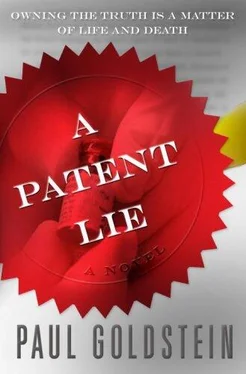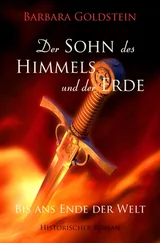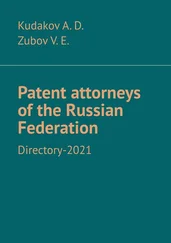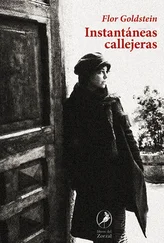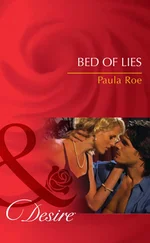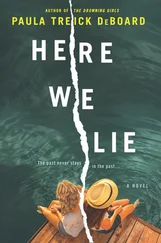Paul Goldstein - A Patent Lie
Здесь есть возможность читать онлайн «Paul Goldstein - A Patent Lie» весь текст электронной книги совершенно бесплатно (целиком полную версию без сокращений). В некоторых случаях можно слушать аудио, скачать через торрент в формате fb2 и присутствует краткое содержание. Жанр: Криминальный детектив, на английском языке. Описание произведения, (предисловие) а так же отзывы посетителей доступны на портале библиотеки ЛибКат.
- Название:A Patent Lie
- Автор:
- Жанр:
- Год:неизвестен
- ISBN:нет данных
- Рейтинг книги:3 / 5. Голосов: 1
-
Избранное:Добавить в избранное
- Отзывы:
-
Ваша оценка:
- 60
- 1
- 2
- 3
- 4
- 5
A Patent Lie: краткое содержание, описание и аннотация
Предлагаем к чтению аннотацию, описание, краткое содержание или предисловие (зависит от того, что написал сам автор книги «A Patent Lie»). Если вы не нашли необходимую информацию о книге — напишите в комментариях, мы постараемся отыскать её.
A Patent Lie — читать онлайн бесплатно полную книгу (весь текст) целиком
Ниже представлен текст книги, разбитый по страницам. Система сохранения места последней прочитанной страницы, позволяет с удобством читать онлайн бесплатно книгу «A Patent Lie», без необходимости каждый раз заново искать на чём Вы остановились. Поставьте закладку, и сможете в любой момент перейти на страницу, на которой закончили чтение.
Интервал:
Закладка:
“So,” Thorpe said at the end of Koosmann's direct testimony, “would it be fair to conclude from your testimony that in the very markets where drug companies make the most profits-the United States and Europe-there is the least demand for a vaccine, and that the demand for a vaccine is the greatest in those regions, primarily Africa, where there is virtually no opportunity for these companies to profit at all?”
“Yes, that is correct.”
“So it is no surprise that the most aggressive research by for-profit companies is being directed to objects other than vaccines?”
“That is correct.”
“No more questions, Your Honor.” Thorpe shuffled away from the lectern, each step a sigh.
Watching the performance, Seeley saw how cleverly Thorpe had arranged his maze of smoke and mirrors. When it came time for the jurors to weigh the evidence, it was not what Koosmann said on the stand, but his coy hesitations and weaselly demeanor that they would compare to the heroic Cordier's forthright manner. Koosmann's effective dismissal of African AIDS victims would repel them. But if Thorpe were ever charged with collusion, no member of an ethics committee reviewing the transcript of Koosmann's testimony would think that Thorpe had done anything less than St. Gall's counsel should have done in refuting Cordier's testimony.
Thorpe's examination of Koosmann had purposely left open several holes through which Seeley could have skewered the witness, and Seeley's reflex as a trial lawyer was to do so. Instead, he took no more than a short jab at Koosmann here and there, and otherwise let his testimony stand. If Thorpe wanted the AV/AS patent upheld, Seeley now wanted it struck down. You are me, Emil, and I am you.
When Seeley returned to counsel's table, and the judge ordered a break, Barnum said, “Is there something wrong with you? That was no cross.”
Heads turned at the defense table. “Let's just take it one step at a time, Ed.” Seeley put a hand over Barnum's. “I need to talk to Chris.”
Palmieri followed Seeley out of the courtroom to the picture-lined alcove at the end of the corridor. Five days ago, Seeley stood here grasping an imaginary baseball bat, fighting the impulse to slam his brother from behind.
Seeley said, “I've decided to do Gupta's cross myself.”
“But we agreed that I-”
“I know we did, Chris, but I need to do Gupta.”
Palmieri backed away, averting his eyes. “You're going to dance around him, the way you did with Koosmann. You're not going to touch him.”
“I'll do whatever I think is right.”
“You don't even know for a fact that the parties are colluding.”
He started away and Seeley grabbed him by the wrist. “There are only a few things I'm certain of, Chris, but this is one of them.” Palmieri shook himself loose and Seeley followed him back to the courtroom.
Dr. Manesh Gupta, chairman of the Immunology Department at Duke University's School of Medicine, was a pouter pigeon. Short, plump, chest puffed out in a dark three-piece suit, his arrogance approached Steinhardt's. Like Koosmann, his testimony would look good on paper, but his attitude would destroy him with the jury.
“Yes,” Gupta said for the third time when Fischler asked whether, in light of the research done by others, the discovery of AV/AS was obvious. This time he added, “Any competent first-year graduate student could have done this work.”
When Fischler finished, Seeley took the notebook Palmieri handed him and brought it to the witness stand. “Dr. Gupta,” he said, handing him the notebook, “I'd like you to look at the expert declaration you provided in this case, which has been marked as defendant's exhibit E. Is this your declaration, Doctor?”
The immunologist answered that it was.
“Looking at page nine, Dr. Gupta, do you see references to three publications from scientific journals?”
“Yes. There are two by Reeves, Kumar, and Constantine, and one by Goldblum et al.”
“Did you rely on these references in concluding that AV/AS was an obvious discovery?”
“Yes, I did.”
“Were these articles difficult to find, Doctor?”
“No, not for any moderately competent researcher. Someone seriously working in the field wouldn't have to look for them at all. He would have a subscription to the journals.”
“And is it your opinion that any ordinarily skilled researcher who read these three articles would find it obvious to make AV/AS?”
The dark head bobbed. “That is correct.”
This was the moment for Seeley to drive home the dagger's blade, as patent litigators have done since experts first began to testify: If, speaking as an expert, this discovery was so obvious to you, why didn't you make it yourself? Instead, Seeley said, “In your opinion, Dr. Gupta, does Dr. Alan Steinhardt possess at least the knowledge and experience of a moderately competent researcher?”
Savagery sparkled in the witness's eyes. “Yes, at least.” The patronizing tone left no question about Gupta's estimate of the gap between Steinhardt's talents and his own.
“In terms of reputation, where would you place Dr. Steinhardt among the ranks of immunologists like yourself?”
“I'd say that he's generally reputed to be among the top twenty researchers.”
“How about the top ten?”
Gupta paused, as if to think. “Yes, perhaps the top ten.”
“Thank you, Dr. Gupta.”
“Redirect, Ms. Fischler?”
There was a hurried conference at the defense table before Fischler said, “No, Your Honor.”
“Then we will recess for the day.” To the jury, the judge said, “I look forward to seeing you bright and early tomorrow morning.”
Barnum's fists were on the tabletop, plump knuckles white. “Why didn't you ask him, if AV/AS was so obvious, why he didn't invent it himself?”
“It's a cheap trick-”
“And it works-”
“Read Gupta's deposition. Fischler already prepared him on it. He would have testified that the government grants that fund his lab don't support the kind of work Steinhardt was doing. He was pursuing a completely different line of research.”
Barnum started to answer, but Seeley was already rising. “Thorpe's waiting for me.” It seemed like months since he agreed to the lunch meeting with his adversary. “I'll see you tomorrow morning.”
Through his cross-examination of Koosmann and Gupta, Seeley had been aware of the judge watching him. Once, when he slipped over an obvious point of attack on Koosmann's testimony, she shook her head unhappily, as she might at a rookie. She understood what he was doing but, short of granting the mistrial Seeley had asked for, there was nothing she could do.
Gail Odum was at the gallery rail by the gate, and she managed a fleeting smile when Seeley walked by. She had witnessed his colloquy with the judge earlier and it took no great journalistic insight to connect his visit to Farnsworth's chambers to the judge's order barring contact with the press. Odum knew that there was a story here, and Seeley wondered whose ache was deeper: hers to hear the story or his to tell it.
“Do you know Schroeder's? A wonderful old place.” As usual, Thorpe's shuffle disappeared as soon as he was out of sight of the jury, and he had no trouble keeping up with Seeley. Market Street where it crossed McAllister churned with life. Young men in wheelchairs zipped across the broad sidewalk, practicing wheelies. Others in elegant exercise outfits and just-out-of-the-box running shoes talked and smoked in clusters at corners and in the doorways of shuttered storefronts.
“It's an old-style German place,” Thorpe said. “A bit of a tourist trap, but if the Koenigsberger Klopse is a special, be sure to order it.”
So reticent in the courtroom, Thorpe now couldn't stop talking. “San Francisco used to be a real trial lawyer's town. There weren't more than ten of us who had a real trial practice back in the fifties. Jake Ehrlich, Mel Belli. Of course, I was just a kid coming up. Federal or state court, civil or criminal, it didn't matter. What mattered was the art of trial practice. Today, anyone with a law degree thinks he's a trial lawyer. There's a lot the old-timers could teach them.”
Читать дальшеИнтервал:
Закладка:
Похожие книги на «A Patent Lie»
Представляем Вашему вниманию похожие книги на «A Patent Lie» списком для выбора. Мы отобрали схожую по названию и смыслу литературу в надежде предоставить читателям больше вариантов отыскать новые, интересные, ещё непрочитанные произведения.
Обсуждение, отзывы о книге «A Patent Lie» и просто собственные мнения читателей. Оставьте ваши комментарии, напишите, что Вы думаете о произведении, его смысле или главных героях. Укажите что конкретно понравилось, а что нет, и почему Вы так считаете.
